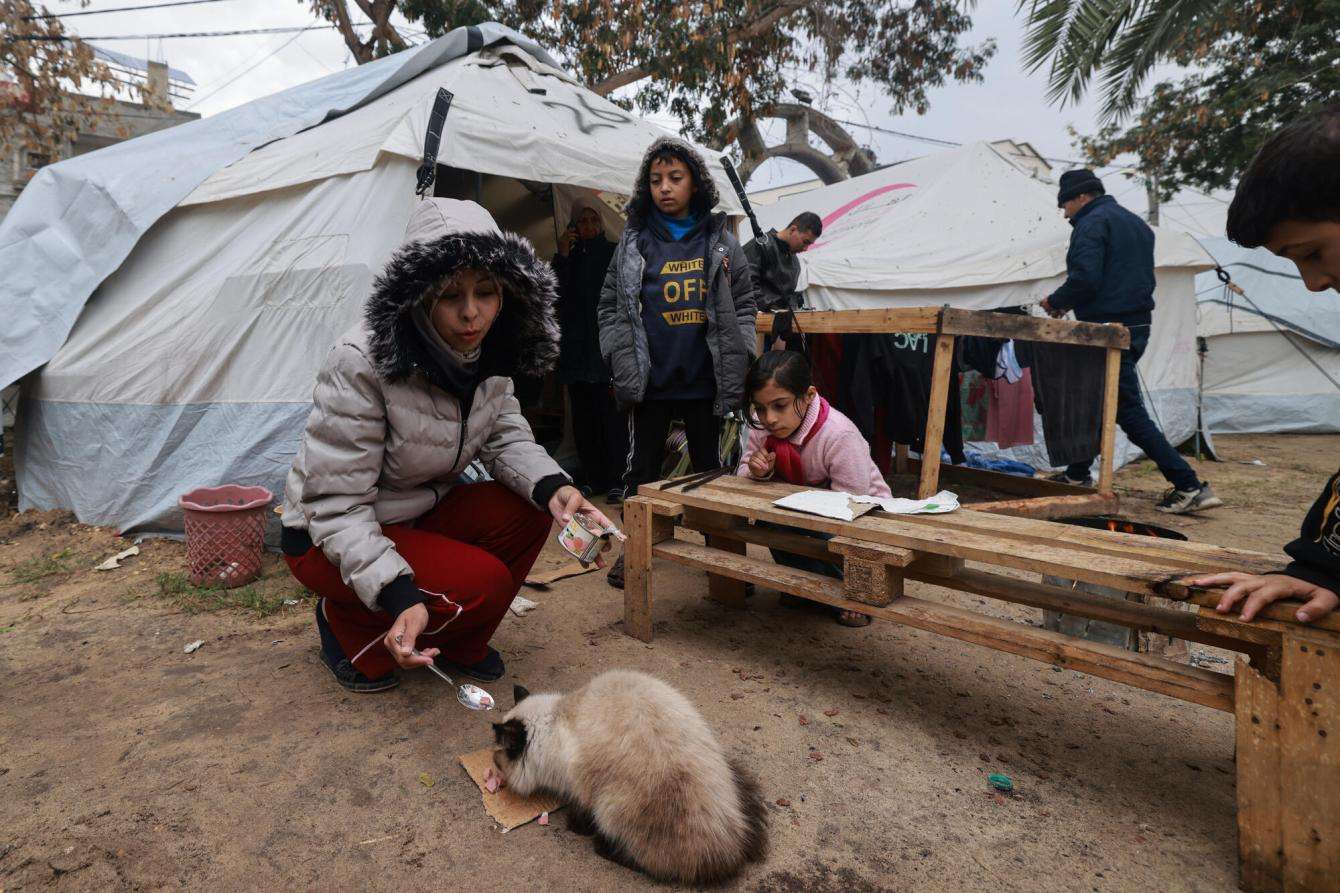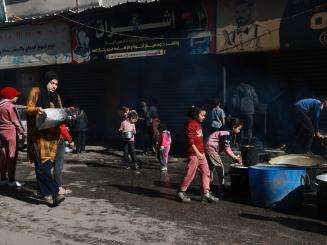Last updated on June 19, 2024
That all changed about a month ago when Israeli forces began increasing military operations in Rafah, leaving people once again in constant fear of being killed in a war they were told they would be insulated from in the south.
Shortly after Israeli forces issued evacuation orders and escalated their military activities in Rafah, they seized control of the Rafah crossing and closed it until further notice, blocking people's access to lifesaving goods and supplies and making it near-impossible for humanitarian organizations to sustain lifesaving operations.
.png?itok=1FModz10)
Where is Rafah?
Rafah is a city on Gaza's southern border with Egypt. Since the war across Gaza escalated in October 2023, Israeli forces told people to flee areas under attack for “safe zones” in the south, primarily Rafah, as they weren’t actively targeting that region until recently. The Rafah crossing with Egypt is a key entry point for humanitarian aid, despite inconsistent and opaque inspection requirements imposed by Israel. Now no aid can come in, and no one in need of medical evacuation can get out.
How many people are in Rafah?
As Israeli forces told people to flee to “safe zones” in and near Rafah from other parts of Gaza where the conflict was most active, more than 1.5 million did so, setting up makeshift shelters and tents amid unsafe, unhealthy, and deplorable living conditions. They joined approximately 300,000 residents who already lived there. However, given Israel’s current military escalation in Rafah, more than 900,000 people have since fled Rafah for areas they hope will be safer.

Are Israeli forces’ so-called “safe zones” really safe?
No. On May 26, at least 49 people were killed and 250 were wounded when an Israeli airstrike hit the neighborhood of Tal Al-Sultan in Rafah. Two days later, on May 28, 21 Palestinians were killed and 64 were injured after Israeli forces bombed another tent camp for displaced people in Al-Mawasi.
“Civilians are being massacred,” said Chris Lockyear, Doctors Without Borders/Médecins Sans Frontières (MSF) secretary general. “They are being pushed into areas they were told would be safe only to be subjected to relentless airstrikes and heavy fighting. Entire families—made up of dozens of people—are crowded into tents and living in extremely difficult conditions.”
Who controls the Rafah crossing?
Israeli forces advanced to the Rafah border crossing and took control on May 7, and since then it has been closed completely until further notice.
“Everything that is vital for daily life is not entering anymore: no humanitarian aid, no medical supplies, no food, no fuel,” said Aurelie Godard, MSF medical team leader in Gaza.
Prior to the Israeli advance to the Rafah border gate, it took weeks for MSF to deliver supplies into Gaza. An aid box’s journey would start at Al-Arish airport in Egypt, then it would need to cross into Rafah, pass through Israel's Nitzana checkpoint, and then return to Rafah for cross-loading, with multiple scans and inspections along the way.
Before the current war, an estimated 500 truckloads of supplies entered Gaza every day. By February 2024, this had reportedly dropped to below 100 truckloads per day. It has been extremely difficult to get supplies—including lifesaving medicines, surgical kits, logistical items, and humanitarian aid supplies—into Gaza due to administrative barriers, movement restrictions, and the lack of options for crossings.

Why is what’s happening in Rafah important?
The evacuation orders and increased military operations underscore the fact that nowhere in Gaza is safe. The only way to protect people in a place without true “safe zones” is by instituting an immediate and sustained ceasefire and ending Israel’s military offensive in Rafah. A ceasefire would prevent more deaths and injuries in Gaza and restore and scale up the flow of humanitarian aid.
How is Doctors Without Borders responding in Rafah?
Since the start of the war in October, Doctors Without Borders teams have been working in Rafah and throughout Gaza, providing surgical support, wound dressing, physiotherapy, vaccination, mental health care, and other essential services. Our teams are also running several water distribution points for displaced people living in the area. MSF is currently operational in three health care facilities in the Rafah area and nearby Al-Mawasi, as well as facilities in other parts of Gaza.


An MSF staff member treats a patient at Rafah Indonesian Field Hospital (left); displaced Palestinians collect water from an MSF distribution point in March. Palestine 2024 © MSF
AL-MAWASI HEALTH POST
At Al-Mawasi Health Post in Rafah, MSF staff are providing outpatient services including general consultations, vaccination, reproductive health care services, wound dressing, mental health services, and health promotion. Our teams carry out 6,000 consultations per week and systematic malnutrition screenings.
RAFAH INDONESIAN FIELD HOSPITAL
Before having to halt activities at Rafah Indonesian Field Hospital on May 12 due to Israeli forces' offensive in Rafah, MSF supported the inpatient department, operating theater, and outpatient department in collaboration with the Ministry of Health. Our teams treated patients in post-operative care (trauma and burn cases). In the 60-bed hospital’s operating theater, surgeons undertook approximately 35 procedures per week. Outpatient care ran six days a week, with about 130 consultations a day, and our teams provided dressing changes for wounds, physiotherapy, and counseling. The 22 patients who remained at the hospital when MSF evacuated were referred to other facilities.
EMIRATI HOSPITAL
Before having to leave the Emirati Hospital in May due to Israeli forces' Rafah offensive, MSF teams were supporting the hospital with medical supplies and staff including gynecologists, nurses, and hygienists working round-the-clock shifts, providing postpartum care and management of pregnancy complications.
TRAUMA STABILIZATION POINT IN TAL AL-SULTAN
On May 14, MSF opened a trauma stabilization point in Tal Al-Sultan, Rafah—a basic facility where patients receive initial treatment before being referred to hospitals for specialist and/or surgical care if needed. On the night of May 26, teams at the trauma stabilization point recorded 180 wounded patients and 28 dead after Israeli airstrikes hit a camp sheltering displaced people in a "safe zone” designated by Israel. On May 27, the trauma stabilization point was forced to close due to heavy bombardments and ground forces operating in the area. All patients were transferred and staff were able to safely evacuate. People in need of care will now directly be taken to the field hospitals that remain open in Al-Mawasi. We are looking for other strategic locations that could benefit from a trauma stabilization point.
Learn more about MSF operations in Rafah and throughout Gaza.
The latest from Rafah
May 28 01:57 PM
Urgent need for ceasefire as Israeli forces attack ‘safe zones’ in Rafah
All countries supporting Israel’s military operations in these circumstances are morally and politically complicit.
Read More
May 27 01:03 PM
Rafah airstrike shows "complete disregard for the lives of civilians in Gaza”
“No single health care facility in Gaza can handle a mass casualty event such as this one.”
Read More-edit.jpg?itok=Kapd6c7S)
May 24 02:48 PM
Doctors Without Borders responds to ICJ order to halt military operations in Rafah
As the Israeli military escalation continues, Palestinians in Rafah are in desperate need of humanitarian aid.
Read More2.png?itok=gS0EysKd)
May 14 08:59 AM
Israeli offensive forces field hospital to close in Rafah
MSF is trying to establish field hospitals elsewhere in Gaza, but these structures will not be able to cope with a massive influx of wounded civilians on top of overwhelming medical needs.
Read More.png?itok=_FT_eNJI)




